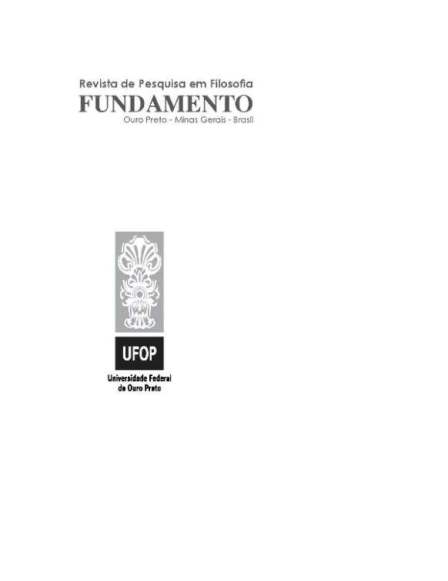A falácia naturalista na metaética contemporânea: usos e equívocos
Abstract
Será realizada uma análise da falácia naturalista conforme Moore e sua relação com Hume para clarifica-la e atualiza-la na lógica formal contemporânea, que denunciará seus limites na metaética atual. Identificarei as origens da expressão falácia naturalista em Moore e refinarei seu significado e uso, contrastando-a com o argumento da questão-em-aberto e a Lei de Hume. Sua aplicação é identificada em quatro aspectos: invalidamente enquanto argumento da questão-em-aberto por não estabelecer uma relação metafísica e prover falsos cognatos, e validamente como erro categorial, erro de identificação equivocada e erro inferencial; este último relacionável com a Lei de Hume como um erro procedimental de argumentação. Breves aplicações evidenciam os limites da falácia naturalista em que contraditoriamente não é uma falácia salvo por apenas um de seus usos, assim como não refuta todas teorias naturalistas (como hedonistas e utilitaristas) além de ser agumento em prol de algumas (como as não-cognitivistas).
References
________. Falácia Naturalista e Naturalismo Moral: do “é” ao “deve” mediante o “quero” in Kriterion vol. 51 nº 121. Belo Horizonte: Editora UFMG, 2010.
________. Ação & Valor na Moral naturalizada. Relatório de pesquisa CNPq. Porto Alegre, 2013.
________. Naturalismo Moral in Manual de Ética – Questões de Ética Teórica e Aplicada. Org. João Carlos Brun Torres. Petrópolis: Vozes, 2014. No prelo.
CHURCHLAND, Patricia. Braintrust. Princeton: Princeton University Press, 2008.
COHON, Rachel. Hume's Moral Philosophy in The Stanford Encyclopedia of Philosophy, Fall 2010 edition, Edward N. Zalta (ed.). Stanford: Stanford University Press, 2010. Disponível em
DALL’AGNOL, Darlei. Valor Intrínseco – Metaética, ética normativa e ética prática em G. E. Moore. Florianópolis: Editora da UFSC, 2005.
DAWKINS, Richard. O Gene Egoísta, trad. Rejane Rubino. São Paulo: Companhia das Letras, 2008.
_______. The Selfish Gene. 30th anniversary edition. New York: Oxford University Press, 2006.
DENNETT, Daniel. Darwin’s Dangerous Idea. London: Penguin Books, 1995.
________. Freedom Evolves. USA: Penguin Books, 2004.
________. Darwin’s “strange inversion of reasoning”. In PNAS: Proceedings of the National Academy of Sciences of the United States of America, Medford, v. 106, p.100661-10065, 16 June 2009. Disponível em
HUME, David. Investigações sobre o entendimento humano e sobre os princípios da moral. Trad. José Marques. São Paulo: Editora UNESP, 2004.
_______. A Treatise on Human Nature : Being an Attempt to Introduce the Experimental Method of Reasoning into Moral Subjects. Leeds Electronic Text Centre, 1740. Disponível em
_______. An Enquiry Concerning the Principles of Morals. Leeds Electronic Text Centre, 1777. Disponível em
_______. Enquiry concerning human understanding. Leeds Electronic Text Centre, 1777. Disponível em
_______. Dialogues concerning natural religion. Leeds Electronic Text Centre, 1779. Disponível em
HURKA, Thomas. Moore’s Moral Philosophy in The Stanford Encyclopedia of Philosophy, Summer 2010 edition, Edward N. Zalta (ed.). Stanford: Stanford University Press, 2010. Disponível em
LENMAN, James. Moral Naturalism. in The Stanford Encyclopedia of Philosophy Edward N. Zalta (ed.) Stanford: Stanford University Press, 2013.
MOORE, George Edward. Principia Ethica. Cambridge: Cambridge University Press, 1959.
_______. Principia Ethica – Revised Edition. Cambridge: Cambridge University Press, 1993.
_______. Ensayos Éticos. Barcelona: Planeta-Agostini, 1994.
PAPINEAU, David. Naturalism, in The Stanford Encyclopedia of Philosophy. Spring, Edward N. Zalta (ed.) Stanford: Stanford University Press, 2009.
PRINZ, Jesse. The Emotional Construction of Morals. Oxford: Oxford University Press, 2007a.
RIDLEY, Matt. Genome: The autobiography of a species in 23 chapters. New York: ed. Harper Perennial, 2006.
________. Genome: The autobiography of a species in 23 chapters. New York: HarperCollins Publishers Inc., 1999.
________. O que nos faz humanos: Genes, natureza e experiência, trad. Ryta Vinagre. 2ª edição. Rio de Janeiro: ed. Record, 2008.
________. Nature via Nurture: Genes, experience, and what makes us humans. New York: HarperCollins Publishers Inc., 2003.
________. The Origins of Virtue: Human Instincts and the Evolution of Cooperation. Londres: Penguin, 1998
SAYRE-MCCORD, Geoff. Moral Realism in The Stanford Encyclopedia of Philosophy Edward N. Zalta (ed.) Stanford: Stanford University Press, 2009.
_______. Metaethics in The Stanford Encyclopedia of Philosophy Edward N. Zalta (ed.) Stanford: Stanford University Press, 2012.
STURGEON, Nicholas L. Ethical Naturalism in The Oxford Handbook of Ethical Theory. David Copp (ed.) Oxford: Oxford University Press, 2006.
TRIVERS, Robert. The evolution of reciprocal altruism in The Quarterly Review Of Biology, v. 46, p.35-57, Mar. Cambridge: Cambridge University Press, 1971.
VICKERS, John, The Problem of Induction, in The Stanford Encyclopedia of Philosophy (Spring 2013 Edition), Edward N. Zalta (ed.). Stanford: Stanford University Press, 2013. Disponível em


.jpg)
